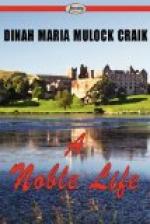But every body in the whole peninsula knew the minister’s grandson, young Master Bruce. The boy was tall of his age—not exactly handsome, being too like his mother for that; nevertheless, the robustness of form, which in her was too large for comeliness, became in him only manly size and strength. He was athletic, graceful, and active; he learned to ride almost as soon as he could walk; and, under Malcolm’s charge, was early initiated in all the mysteries of moor and loch. By fourteen years of age Cardross Bruce was the best shot, the best fisher, the best hand at an oar, of all the young lads in the neighborhood.
Then, too, though allowed to run rather wild, he was unmistakably a gentleman. Though he mixed freely with every body in the parish, he was neither haughty nor over-familiar with any one. He had something of the minister’s manner with inferiors—frank, gentle, and free—winning both trust and love, and yet it was impossible to take liberties with him. And some of the elder people in the clachan declared the lad had at times just “the merry glint o’ the minister’s e’en” when Mr. Cardross first came to the parish as a young man with his young wife.
He was an old man now, “wearin’ awa’,” but slowly and peacefully; preaching still, though less regularly; for, to his great delight, his son Duncan, having come out creditably at college, had been appointed his assistant and successor. Uncle Duncan—only twelve years his nephew’s senior—was also appointed by Lord Cairnforth tutor to “Boy” Bruce. The two were very good friends, and not unlike one another. “Ay, he’s just a Cardross,” was the universal remark concerning young Bruce. No one had ever hinted that the lad was like his father.
He was not. Nature seemed mercifully to have forgotten to perpetuate that type of character which had given Mr. Menteith formerly, and others since, such a justifiable dread of the Bruce family, and such a righteous determination to escape them. Lord Cairnforth still paid the annuity, but on condition that no one of his father’s kindred should ever interfere, in the smallest degree, with Helen’s child.
This done, both he and she trusted to the strong safeguards of habit and education, and all other influences which so strongly modify character, to make the boy all that they desired him to be, and to counteract those tendencies which, as Lord Cairnforth plainly perceived, were Helen’s daily dread. It was a struggle, mysterious as that which visible human free-will is forever opposing (apparently) to invisible fate, the end of which it is impossible to see, and yet we struggle on.
Thus laboring together with one hope, one aim, and one affection, all centered in this boy, Lord Cairnforth and Mrs. Bruce passed many a placid year. And when the mother’s courage failed her—when her heart shrank in apprehension from real terrors or from chimeras of her own creating, her friend taught her to fold patiently her trembling hands, and say, as she herself and the minister had first taught him in his forlorn boyhood, the one only prayer which calms fear and comforts sorrow—the lesson of the earl’s whole life—“Thy will be done!”




